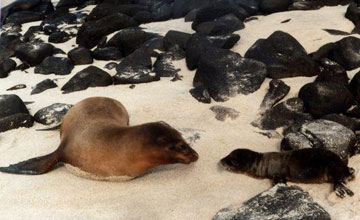WWF condemns iron fertilization scheme to fight global warming
WWF condemns iron fertilization scheme to fight global warming
mongabay.com
June 28, 2007
Environmental group WWF condemned a scheme by Planktos, Inc. (OTCBB: PLKT) to dump up to 100 tons of iron dust in the open ocean west of the Galapagos Islands. The firm claims the experiment will fertilize massive blooms of phytoplankton that will absorb carbon dioxide from the atmosphere and help fight global warming.
The plan, which relies on the use of foreign vessels to skirt the U.S. Ocean Dumping Act, has been widely criticized by environmentalists, who say it could be damaging to the rich array of species living in the waters near the Galapagos, including 400 species of fish, turtles, penguins, marine iguanas, and corals.
“There are much safer and proven ways of preventing or lowering carbon dioxide levels than dumping iron into the ocean,” said Dr. Lara Hansen, chief scientist, WWF International Climate Change Program. “This kind of experimentation with disregard for marine life and the lives of people who rely on the sea is unacceptable.”
 Sea lions in the Galapagoes |
“World Wildlife Fund’s concern extends beyond the impact on individual species and extends to the changes that this dumping may cause in the interaction of species, affecting the entire ecosystem,” said Dr. Sallie Chisholm, microbiologist, MIT and board member, World Wildlife Fund. “There’s a real risk that this experiment may cause a domino effect through the food chain.”
WWF says that the Planktos experiment could have unanticipated effects on plankton, which serve as the base of the marine food chain. The changes could ripple through the food chance to impact other species.
The group says that any bloom of phytoplankton induced by Planktos would be accompanied by a bloom in bacteria as phytoplankton die. These bacteria may produce gases–like nitrous oxide, a powerful greenhouse gas–that counteract the effects of carbon sequestration by phytoplankton. Further, bacterial decay consumes oxygen, which alters water chemistry.
The group also warns that the introduction of large amounts of iron to the ecosystem would likely be accompanied by other trace metals that would be toxic to some forms of marine life.
Planktos, a publicly traded company, is current conducting open ocean trails and installing scientific gear on its research ship, Weatherbird II. The firm plans to head to the Eastern Tropical Pacific to begin its series of ocean plankton pilot projects in mid to late July.